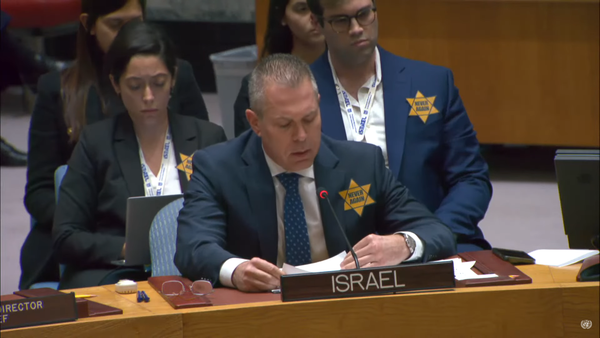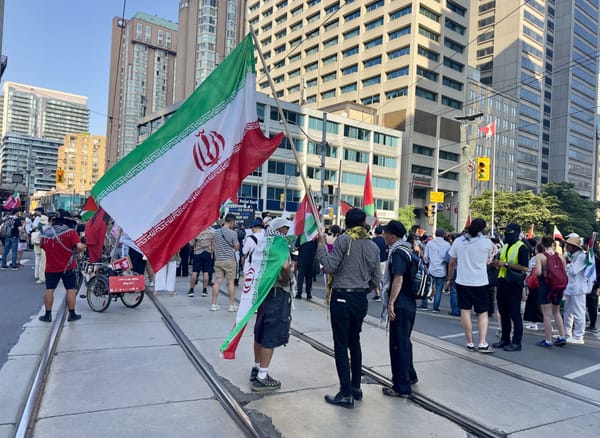As a media critic with a particular focus on pro-Israel bias, the past few months have been deeply disturbing, though not surprising. With few exceptions, mainstream media outlets in Canada have either outright supported Israel’s ongoing genocide in Gaza or failed to report on it critically. The most disappointing outlet throughout much of this period for me, though certainly not the worst, has been an independent one: Canadaland.
I have read and listened to Canadaland for the better part of a decade. My work has been referenced and discussed in several Canadaland podcast episodes, and I’ve also written for the publication, appeared on one of its shows, and been asked to appear many more times. As such, I think I can be included as one of the publication’s “listeners and supporters” to whom its staff, in a Dec. 14, 2023, statement through their union, pledged to re-establish trust with following weeks of what they described as “irresponsible” statements from publisher and founder Jesse Brown. Unfortunately, more than seven weeks after the union’s statement, they haven’t done so.
Then again, I never particularly trusted Canadaland’s coverage of Palestine.
Canadaland portrays itself as an alternative voice in the Canadian media landscape, and on many issues and topics, this is the case. I have found great benefit in some of the work Canadaland has done, and consider it to be a definite net positive for readers and listeners in this country. However, Canadaland’s record on foreign policy issues (such as conflicts abroad and how they’re covered domestically) isn’t much different than what is pumped out in mainstream outlets. This applies to its Palestine coverage in particular as well.
Like mainstream outlets, Canadaland rarely features the voices of Palestinians on matters relating to Palestine. A search of Canadaland content with a significant focus on Palestine from the time of its foundation onward returned 23 results: three articles and 20 podcast episodes. None of these articles were written by a Palestinian. The podcast episodes had 27 guests between them. Just two of those guests were Palestinians, and in one case they were invited due to my suggestion to a Canadaland producer after I turned down their request to appear on the show. In other words, the overall count of Palestinians could have easily been just one. In a more recent episode, Brown implied the general desire to hear from Palestinians was unreasonable because of the community’s “tiiiiiiny” size in Canada, and stated that featuring someone to speak on their behalf was enough.
Like mainstream outlets, Canadaland has engaged in the despicable editorial practice of labelling Gazan health ministries as being “Hamas-run” when referencing their count of Palestinian casualties, a way to hint that the counts shouldn’t be trusted.
Like mainstream outlets, Canadaland’s approach to discussing matters on Palestine over the years has often faithwashed the issue (portraying it as a conflict between Muslims and Jews), focused exclusively on how Jewish people in Canada feel it impacts them or treated the issue as something particularly “complicated” that they were hesitant to talk about, despite reporting on all sorts of nuanced subjects. In at least one case, it was made into a joke, with the topic being preceded by exaggerated disclaimers and complaints.
Like mainstream outlets, a senior staffer from Canadaland (in this case, Brown) took part in a pile on against a Canadian Journalists for Free Expression employee who put out a statement on behalf of the organization criticizing the Israeli government for killing fellow journalists.
When compared to how other independent outlets in Canada have covered the way the media reports on Palestine here, Canadaland has trailed behind, particularly since October 7.
For what it’s worth, and to ensure I gave Canadaland and its staffers as much of a fair assessment as possible, I read and listened to everything they put out on Palestine or matters connected to it in English since October 7, meaning several hours of listening to Jesse Brown yap at 1.75 speed.
It’s not that Canadaland has failed to publish anything of value since then, as some of these episodes were well done. The issue is more so that the majority of what has been released is unremarkable, making it easy for Brown’s antics — such as his focus on Toronto Star journalist Shree Paradkar and commenting “Jewish-owned bookstore vandalized” in response to Indigo being protested due to its owner’s creation of a program to support “lone soldiers” to Israel — to outshine this work. Canadaland has yet to put out a single podcast episode or article that has significantly advanced the narrative on, or an understanding of, media coverage of Israel’s genocide in Gaza (for me, at least).
Much of the discussion on the matter in the public realm has put the blame for the past few months at Canadaland solely on Brown, as if the publication doesn’t have 24 other people currently listed as staff members, including various editors, producers and podcast hosts. The Canadaland union statement itself did this, to an extent, stating that “Jesse’s outsized voice and comments have often overshadowed much of our other work.”
However, they added, “The opinions of Jesse Brown do not limit or determine the extent of our own coverage.” Taking them at their word, why hasn’t a single article about the topic not written by Brown since October 7 been published? Why has a greater percent of the episodes related to Palestine released since their statement been from, or featured, Brown, than before the statement? Rather than winning back my trust since that statement was released in response to Brown’s actions, it appears as if staffers have mostly ceded the floor to him.
And one of the two episodes put out since the statement where another employee mostly took charge was perhaps the most disappointing they’ve released since October 7. A January 8 episode featured two interviews conducted by Canadaland’s editor about the “tremendous difficulty” for journalists in covering what they called “the war with Israel and Palestine.” The fact that Israel has killed a record-number of journalists since October 7 took up about five seconds of discussion in a 40-minute episode, with the guest who brought it up just offering a number of reporters killed without saying where they were killed or who killed them. (Israel has killed at least 122 journalists and media workers in Gaza since October 7. Here are some of their names and stories.) For comparison, one of the guests and the host spent more time joking about how scared they were to check Twitter after the episode was released.
I write this about Canadaland not because I think it’s worse or even comparable to many others, such as the scumbags at the National Post. Instead, it’s because I expect better, even if I’ve been disappointed in the past.
As an example, in one Canadaland episode the hosts praised a study put out by The Breach into the pro-Israel bias at CTV. One host made the correct point that investigations into other outlets would likely find similar results, and then expressed hope that some journalists out there would take up the task of doing something more comprehensive. I practically shouted at my phone when I heard this request. Canadaland is no longer one of the only publications that does media criticism, but it remains by far the largest. It has the qualified staff, the resources and the audience. It does not have an excuse. It should be doing better work on this issue — the sort of work the Canadaland host hoped someone would do.
Israel’s genocide in Gaza is an issue that proves the need for the existence of genuinely independent and alternative media outlets given the overwhelming bias in mainstream publications. The Maple has tried to do our best as media critics throughout the past few months with our limited resources. With the exception of The Breach, and some important one-off articles from other journalists, we’ve been too alone. Canadaland’s relative absence, however, has been felt the most.
I, like so many other Canadaland readers and listeners, expect better, and hope it is to come.







